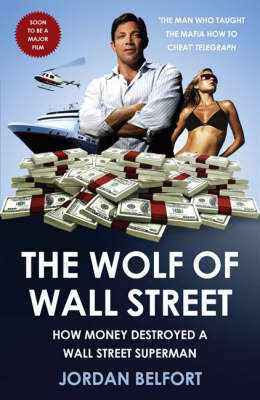 I recently read this outrageous confessional by super-successful pump-and-dumper Jordan Belfort.
I recently read this outrageous confessional by super-successful pump-and-dumper Jordan Belfort.I'm not particularly sold on sorry-for-criminals (The Godfather, The Sopranos and all the rest of that genre); I think it's an emotional con that salves our conscience for being imaginatively complicit in the crimes.
But I do think Belfort is a victim as well as a perpetrator; a driven, a hag-ridden man. How much of history has been shaped by these out-of-control types? Mao saw himself as a destructive natural force; Stalin wondered why people had always helped him.
One feature of Belfort's story that sticks in my mind is how he used the louche, high-burn lifestyle at Stratton-Oakmont as a means to enslave his employees. As he explained (p.86) to his financially prudent father during a row about expenses:
"There's a method to my madness, especially when it comes to the spending. It's important to keep these guys chasing the dream. And it's even more important to keep them broke. Look at them; as much money as they make, every last one of them is broke! They spend every dime they have, trying to keep up with my lifestyle. But they can't, because they don't make enough. So they end up living paycheck to paycheck on a million bucks a year. It's hard to imagine, considering how you grew up, but, nevertheless, it is what it is.
"Anyway, keeping them broke makes them easier to control. Think about it: virtually every last one of them is leveraged to the hilt, with cars and homes and boats and all the rest of that crap, and if they miss even one paycheck they're up shit's creek. It's like having golden handcuffs on them. I mean, the truth is I could afford to pay them more than I do. But then they wouldn't need me as much. But if I paid them too little, then they would hate me. And as long as they need me they'll always fear me."
Belfort is plenty clever enough to play the repentant sinner - his book makes clear his manipulative approach to loved ones as well as employees - but it may well be that a part of him wanted to be stopped. The addictive, compulsive pleasuring is a whirring of hind legs scrambling to get away from the edge of what Clarissa Dickson-Wright calls "the abyss", to which even death is preferable. His permanently overactive mind required daily stunning with Quaaludes, because he didn't know how else to slow it down.
Returning to Stalin, another who could control everything except himself, I recall a TV programme about concert pianist Maria Yudina, who dared to write to him in frank terms that one would have thought were certain to get her shot or sent to Siberia. I have tried to find a transcript but this is the best I can do - though I clearly remember she referred not to his soul, but his "black heart". She had a courage almost insane. And yet he spared her. Was there a speck of gold left in the Stygian recesses of his spirit? I think so. When anticlericals have finished railing against bells and smells, there will still be the issue of the abyss and the light.
No comments:
Post a Comment